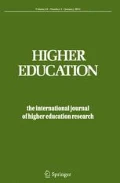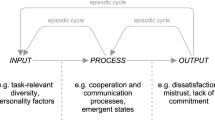Abstract
International research collaboration raises questions about how groups from different national and institutional contexts can work together for common ends. This paper uses issues that have arisen in carrying out the first stage of an international research project to discuss a framework designed to map different kinds of multi-national research collaboration in terms of increasing complexity and increasing time to research outputs. The paper explores factors that enable and that constrain progress in carrying out collaborative research. The paper highlights the complex interplay within research practice of factors that derive from institutional structures and those that appertain to individuals as agents. It uses the personal and collective reflexive deliberations of the authors, to demonstrate that as the complexity of the research interface increases, and as the time to research outputs increases, so structural risk increasingly develops into agentic risk, and that structural risk becomes increasingly required to be managed through agentic action.


Similar content being viewed by others
References
Archer, M. S. (2000). Being human: The problem of agency. Cambridge: Cambridge University Press.
Archer, M. S. (2003). Structure, agency and the internal conversation. Cambridge: Cambridge University Press.
Archer, M. S. (2007). Making our way through the world: Human reflexivity and social mobility. Cambridge: Cambridge University Press.
Australian Government. (2007). National statement on ethical conduct in human research. Canberra, ACT: Australian Government.
Boud, D., Dahlgren, L-O., Abrandt Dahlgren, M., Larsson, S., Sork, T., & Walters, S. (2006). Creating a ‘world class’ program: reciprocity and constraint in networked global collaboration. International Journal of Lifelong Education, 25(6), 609–622.
Brew, A., & Boud, D. (2009). Understanding academics’ engagement with research. In A. Brew & L. Lucas (Eds.), Academic research and researchers (pp. 189–203). London: Open University Press and Society for Research into Higher Education.
Brew, A., Boud, D., & Namgung, S. U. (2011). Influences on the formation of academics: Perspectives of Australian academics. Studies in Continuing Education 33, 1, 51–66.
Crawford, K. (2010). Influences on academics' approaches to development: voices from below. International Journal for Academic Development, 15(3), 189–202.
Kyvik, S., & Teigen, M. (1996). Child care, research collaboration, and gender differences in scientific productivity. Science, Technology and Human Values, 21(1), 54–71.
Lee, S., & Bozeman, B. (2005). The impact of research collaboration on scientific productivity. Social Studies of Science, 35(5), 673–702.
Locke, W., & Bennion, A. (2010), The changing academic profession: The UK and beyond, UUK research report. London: Universities UK. Retrieved 10 July 2011 from http://www.open.ac.uk/cheri/documents/the_changing_academic_profession_in_the_uk_and_beyond.pdf.
Lucas, L. (2006). The research game in academic life. Maidenhead: Society for Research into Higher Education and the Open University Press.
McNay, I. (2003). Assessing the assessment: An analysis of the UK research assessment exercise 2001 and its outcomes, with special reference to research in education. Science and Public Policy, 30(1), 1–8.
McQueen, K. M., & Guest, G. (2008). Handbook for team based qualitative research. Plymouth: Altimira Press.
Pérez, A. I., Blanco, N., Ogalla, M., & Rossi, F. (1998). The flexible role of the researcher within the changing context of practice: Forms of collaboration. Educational Action Research, 6(2), 241–255.
Rambur, B. (2009). Creating collaboration: An exploration of multinational research partnerships. In A. Brew & L. Lucas (Eds.), Academic research and researchers (pp. 80–95). Basingstoke: Society for Research into Higher Education and the Open University Press.
Solomon, N., Boud, D., Leontios, M., & Staron, M. (2001). Researchers are learners too: Collaboration in research on workplace learning. Journal of Workplace Learning, 13, 7/8, 274–281.
Author information
Authors and Affiliations
Corresponding author
Rights and permissions
About this article
Cite this article
Brew, A., Boud, D., Lucas, L. et al. Reflexive deliberation in international research collaboration: minimising risk and maximising opportunity. High Educ 66, 93–104 (2013). https://doi.org/10.1007/s10734-012-9592-6
Published:
Issue Date:
DOI: https://doi.org/10.1007/s10734-012-9592-6




